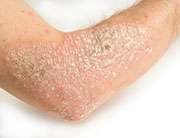(HealthDay)—Compared with controls, patients with psoriasis vulgaris do not have significant differences in general psychiatric symptoms and strategies for coping, but do have lower sleep quality, according to a study published online May 6 in the International Journal of Dermatology.
Ilknur Balta, M.D., from the Kecioren Training and Research Hospital in Ankara, Turkey, and colleagues examined general psychiatric symptoms, quality of sleep, and coping strategies for 37 patients with psoriasis vulgaris (mean age, 39.18 years) and 42 controls (mean age, 39.33 years).
The researchers observed no significant differences between the groups in scores on the Symptom Checklist-90-R, used to assess general psychopathological status, or on the Coping Orientations to Problems Experienced Scale, used to assess coping strategies. For subjective sleep quality and habitual sleep efficiency subscales of the Pittsburgh Sleep Quality Index, significant between-group differences were observed (P = 0.049 and 0.014, respectively).
"Sleep quality is lower in psoriasis vulgaris patients than in healthy controls. This may be associated with the itch and pain caused by lesions," the authors write. "Further experimental studies are required to explain these findings."
More information:
Abstract
Full Text (subscription or payment may be required)
Copyright © 2015 HealthDay. All rights reserved.





















